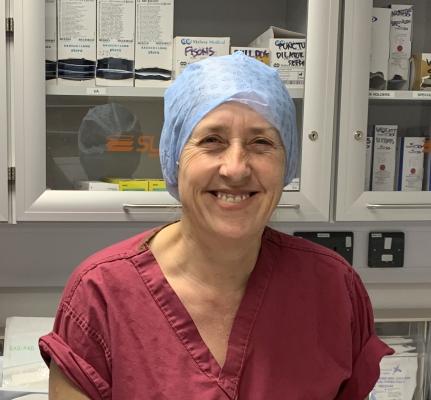Nursing associate
Nursing associates work with healthcare support workers and registered nurses to deliver care for patients and the public.
Working life
Nursing associates work across all four fields of nursing: adult, children’s, mental health, and learning disability. Your skills and responsibilities will vary, depending on the care setting you work in. You’ll need to demonstrate the values and behaviours of the NHS Constitution.
Your duties are likely to include:
- undertaking clinical tasks including venepuncture and ECGs
- supporting individuals and their families and carers when faced with unwelcome news and life-changing diagnoses
- performing and recording clinical observations such as blood pressure, temperature, respirations and pulse
- discussing and sharing information with registered nurses on a patient's condition, behaviour, activity and responses
- ensuring the privacy, dignity and safety of individuals is maintained at all times
- recognising issues relating to safeguarding vulnerable children and adults
Pay and benefits
Your standard working week will be around 37.5 hours and may include a mix of shifts, such as nights, early starts, evenings and weekends. As a student nursing associate, you’ll usually be paid on band 3 of the Agenda for Change (AFC) pay system, with registered nursing associates usually employed on band 4.
You’ll also have access to our generous pension scheme and health service discounts, as well as 27 days of annual leave, plus bank holidays, which increases the longer you’re in service.
Entry requirements
To begin your training as a nursing associate, you’ll need GCSEs grade 9 to 4 (A to C) in maths and English, or Functional Skills Level 2 in maths and English. Some employers will also ask for a level 3 qualification. You'll also need to show that you can study for a foundation degree level and complete the Nursing Associate Apprenticeship programme.
Student nursing associate places are usually advertised on NHS Jobs but some places are available through direct application to universities. Applicants accepted onto university courses will need to fund their own training.
Peggy-Jane Murrell
Student nursing associate
Read Peggy's storyI have always been made to feel very welcome and supported in my new role.

Your training
You'll undertake a combination of academic learning and work-based learning. You'll be employed in a healthcare setting such as an acute, community or mental health hospital, care home or hospice but also gain experience in other settings. This will mean travelling to placements and working a mix of shifts.
It is very important to plan and manage the competing demands of your job role, study and placements. You'll develop an understanding of all elements of nursing and caring for individuals with conditions such as dementia, mental ill health and learning disabilities/difficulties.
Career development
Once you’ve finished your training, you’ll have the knowledge, understanding, skills, attitudes and behaviours to work as a nursing associate. Registered nursing associates can also go on to train as a registered nurse by putting their training towards a shortened nursing degree or registered nurse degree apprenticeship (RNDA).
Your nursing associate training may shorten a registered nurse degree apprenticeship to 2 years.
To find out more about the apprenticeship route, including how to apply, speak with your line manager, education team or apprenticeship lead. Your employer may want you to complete a year working as a registered nursing associate before you progress to registered nurse training.
Registration
The Nursing and Midwifery Council (NMC) is responsible for registering and regulating nursing associates.
Displaying 21 - 25 of 25 matches
-
Nursing associate FdSc
University of Chester
View courseOpens in a new window
- Study mode
- Full-time
- Duration of the course
- 2 years
- Leading to a career in
- Nursing associate
- Contact details
- [email protected] +44 (0)1244 511000
- Region
- North West
- Admissions address
- University Centre Warrington
Sarah Parker Remond House
Barbauld St
Warrington
Cheshire
WA1 1WA
-
Nursing associate FdSc
Plymouth Marjon University
View courseOpens in a new window
- Study mode
- Full-time
- Duration of the course
- 2 years
- Leading to a career in
- Nursing associate
- Contact details
- [email protected] +44 (0) 1752636700
- Region
- South West
- Admissions address
- Plymouth Marjon University,
Derriford Road,
Derriford,
Plymouth
PL6 8BH
-
Nursing associate (foundation degree in healthcare)
City, University of London
View courseOpens in a new window
- Study mode
- Full-time
- Duration of the course
- 2 years
- Leading to a career in
- Nursing associate
- Contact details
- [email protected] +44 (0)20 7040 5000
- Region
- London
- Admissions address
- City, University of London
Northampton Square
London EC1V 0HB
United Kingdom
-
Nursing associate FdSc
University of Salford
View courseOpens in a new window
- Study mode
- Full-time
- Duration of the course
- 2 years
- Leading to a career in
- Nursing associate
- Contact details
- Contact Form +44 (0) 1612955000
- Region
- North West
- Admissions address
- Peel Park
University of Salford
43 Crescent
Salford
M5 4WT
-
Nursing associate FdSc
South Devon College
View courseOpens in a new window
- Study mode
- Full-time
- Duration of the course
- 2 years
- Leading to a career in
- Nursing associate
- Contact details
- Contact Form 08000380123
- Region
- South West
- Admissions address
- South Devon College,
Long Road,
Paignton,
TQ4 7EJ
-
Nursing Associate
Milton Keynes, MK6 5LD
- Salary :
- £27485.00 to £30162.00
- Type :
- Permanent
- Employer :
- Milton Keynes University Hospital NHS Foundation Trust
-
Nursing Associate
Westgate-on-sea, CT8 8SN
- Salary :
- Negotiable
- Type :
- Permanent
- Employer :
- Westgate Surgery
-
Nursing Associate
London, SE8 5DA
- Salary :
- £30000.00 to £33000.00
- Type :
- Permanent
- Employer :
- Penrose Health
-
Nursing Associate
Witney, OX29 4QB
- Salary :
- £13.19 to £14.23
- Type :
- Permanent
- Employer :
- Eynsham Medical Group
-
Nursing Associate
Exeter, EX2 5DW
- Salary :
- £27485.00 to £30162.00
- Type :
- Permanent
- Employer :
- Royal Devon University Healthcare NHS Foundation Trust
-
Nursing Associate
Salisbury, SP5 3JP
- Salary :
- Negotiable
- Type :
- Permanent
- Employer :
- Downton Surgery
-
Nursing Associate
York, YO318HE
- Salary :
- £27485.00 to £30162.00
- Type :
- Permanent
- Employer :
- York and Scarborough Teaching Hospitals NHS Foundation Trust
-
Nursing Associate
Canterbury, CT1 3NG
- Salary :
- £27485.00 to £30162.00
- Type :
- Permanent
- Employer :
- Kent Community Health NHS Foundation Trust
-
Nursing Associate
Faversham, Deal, Hawkhurst, Herne Bay, Tonbridge, Whitstable, TN25 4AZ
- Salary :
- £27485.00 to £30162.00
- Type :
- Permanent
- Employer :
- Kent Community Health NHS Foundation Trust
-
Nursing Associate
Hereford, HR1 4HA
- Salary :
- £28731.00 to £30214.00
- Type :
- Permanent
- Employer :
- St Michael’s Hospice
-
Nursing Associate
Manchester, M8 0DA
- Salary :
- £26530.00 to £29114.00
- Type :
- Permanent
- Employer :
- Collegiate Medical Centre
-
Qualified Nursing Associate
York and Selby, YO26 5LD
- Salary :
- £27485.00 to £30162.00
- Type :
- Permanent
- Employer :
- Tees Esk and Wear Valleys NHS Foundation Trust
-
Nursing Associate - Critical Care
Salford, M6 8HD
- Salary :
- £27485.00 to £30162.00
- Type :
- Permanent
- Employer :
- Northern Care Alliance NHS Foundation Trust
-
Trained Nursing Associate - Outpatients
Victoria Road, Macclesfield, SK10 3BL
- Salary :
- £27485.00 to £30162.00
- Type :
- Permanent
- Employer :
- East Cheshire NHS Trust
-
Nursing Associate - Band 4
Haslemere, GU27 2BJ
- Salary :
- £28860.00 to £31671.00
- Type :
- Permanent
- Employer :
- Procare Community Services
-
Qualified Nursing Associate (Community)
Easington, SR8 3DY
- Salary :
- £27485.00 to £30162.00
- Type :
- Permanent
- Employer :
- Tees Esk and Wear Valleys NHS Foundation Trust
-
Nursing Associate - Critical Care
Oldham, OL1 2JH
- Salary :
- £27485.00 to £30162.00
- Type :
- Permanent
- Employer :
- Northern Care Alliance NHS Foundation Trust
-
Nursing Associate - Bodmin & 3 Harbours
Bodmin, PL312LB
- Salary :
- £27485.00 to £30162.00
- Type :
- Permanent
- Employer :
- Cornwall Partnership NHS Foundation Trust
-
Nursing Associate (Day Case Theatre Ward)
Dudley, DY1 2HQ
- Salary :
- £27485.00 to £30162.00
- Type :
- Permanent
- Employer :
- The Dudley Group NHS Foundation Trust
-
Associate Postgraduate Dean - Trainee Experience
Leicester, LE3 8RA
- Salary :
- Negotiable
- Type :
- Secondment
- Employer :
- NHS England
-
Research Associate
London, WC1N 3BG
- Salary :
- £37259.00 to £45356.00
- Type :
- Fixed-Term
- Employer :
- University College London Hospitals NHS Foundation Trust
Showing 6 of 21 results
-
If you're no longer a registered nursing associate, returning to practice is really straightforward. Here's how you can do it:
- readmission
- Test of competence
- return to practice course
Readmission
You might be able to re-register with the NMC without doing a course or a test. You'll need to contact the NMC to find out how to do this.
Test of competence
The test is made up of two parts:
- a multiple choice computer based test (CBT)
- a practical test known as the Objective structured clinical examination (OSCE)
You can apply through the NMC website, where you'll also find lots of preparation materials and essential reading to help you revise for the test.
Return to practice course
A return to practice course will refresh your skills, leaving you ready to return to being a nursing associate with confidence. It involves a combination of classroom and placement-based learning. Find return to practice courses on our course finder.





